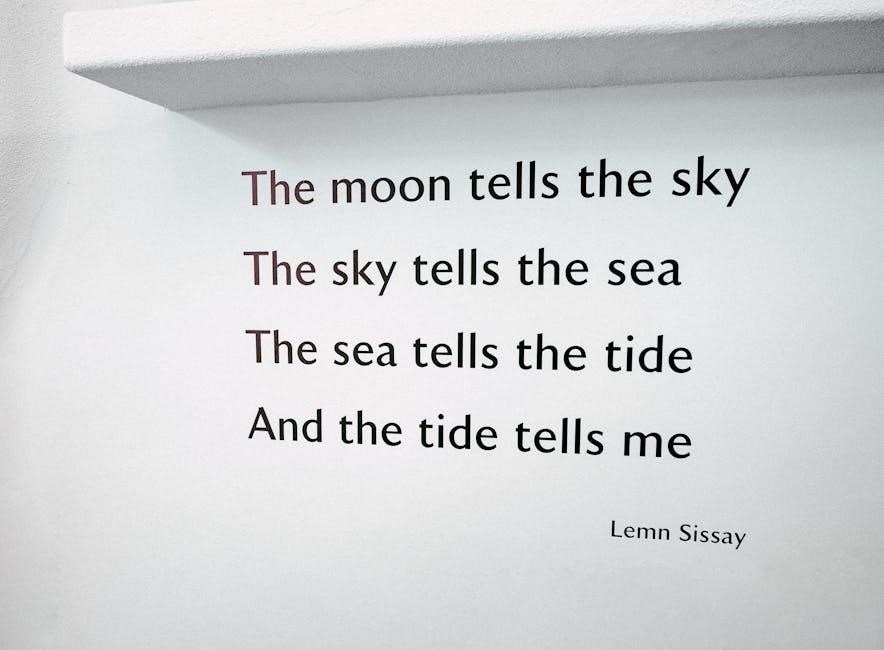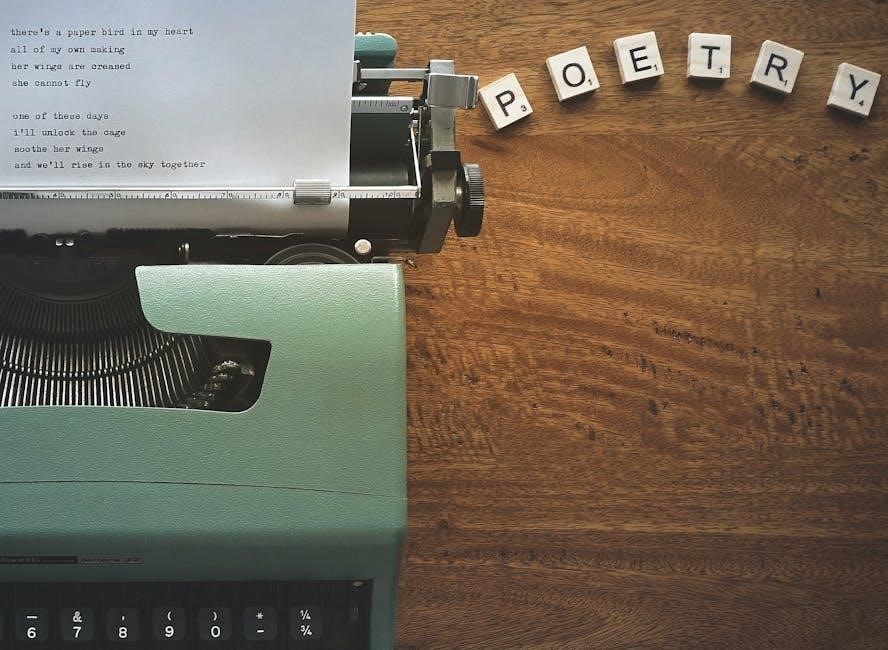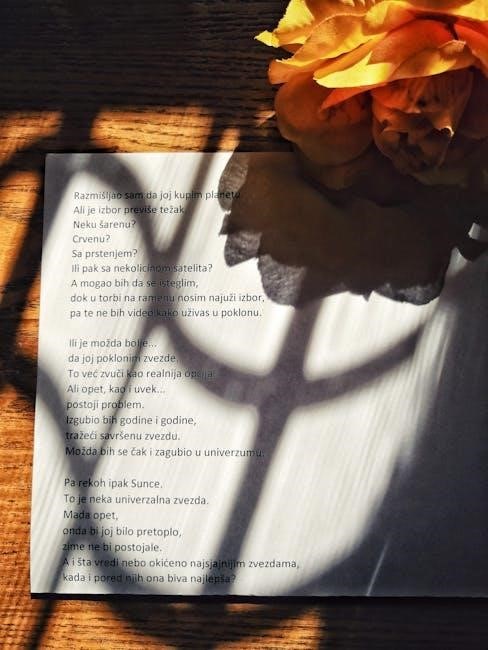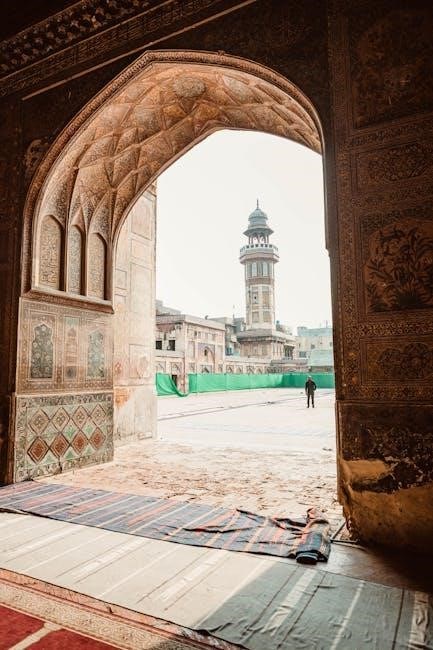Samuel Taylor Coleridge’s iconic poem, Kubla Khan, written in 1797 and published in 1816, is a visionary fragment known for its vivid imagery and dreamlike quality․ Available as a PDF, it remains a cornerstone of Romantic literature, exploring themes of beauty and the subconscious․
Brief Overview of the Poem
Kubla Khan is a poetic fragment by Samuel Taylor Coleridge, written in 1797 and published in 1816․ It describes the majestic pleasure-dome of Kubla Khan in Xanadu, blending vivid imagery and symbolism․ The poem begins with the Khan’s decree to build a “stately pleasure-dome” near the sacred river Alph, which flows through caverns to a sunless sea․ Coleridge’s opium-influenced dream inspired the vision, but upon waking, he could only recall fragments․ The poem explores themes of beauty, power, and the supernatural, showcasing Romanticism’s emphasis on imagination․ Its unfinished nature adds to its mystique, leaving readers to ponder the lost lines and the fleeting nature of creative inspiration․
Author and Publication Details
Kubla Khan was written by Samuel Taylor Coleridge, a prominent English Romantic poet, critic, and philosopher․ Completed in 1797, the poem was not published until 1816, nearly two decades later․ Coleridge, born in 1772 and passing in 1834, was a founding figure of the Romantic movement, alongside William Wordsworth․ His work is celebrated for its imaginative depth and emotional resonance․ Kubla Khan remains one of Coleridge’s most famous compositions, alongside The Rime of the Ancient Mariner and Christabel․ The poem’s unique history and dreamlike origins have cemented its place in literary history, making it a cornerstone of Romantic-era poetry․

Historical Background
The poem draws inspiration from Kublai Khan, the Mongol emperor who ruled China in the 13th century, and his legendary summer palace, Xanadu․ This historical context shapes the poem’s exotic imagery and themes of power and beauty, reflecting the cultural richness of the Mongol Empire during its zenith․
Kublai Khan and the Mongol Empire
Kublai Khan, the grandson of Genghis Khan, was a Mongol emperor who ruled over a vast empire stretching from China to Eastern Europe․ He founded the Yuan dynasty in China and established his summer capital, Xanadu, as a symbol of his power and opulence․ The Mongol Empire, under his leadership, became a center of cultural and political influence, blending Mongol traditions with Chinese practices․ Kublai Khan’s court attracted scholars, merchants, and artisans, fostering a unique cultural synthesis․ His reign marked the zenith of Mongol dominance, leaving a lasting legacy in history and inspiring Coleridge’s vivid portrayal of Xanadu in Kubla Khan․

Xanadu: The Summer Palace
Xanadu, or Shangdu, was Kublai Khan’s legendary summer palace in Mongolia, a place of breathtaking beauty and grandeur․ Built in the 13th century, it served as a royal retreat and a symbol of Mongol wealth․ The palace featured a “stately pleasure-dome,” surrounded by lush gardens, intricate architecture, and a serene landscape․ Xanadu was not just a physical structure but a cultural and political hub, reflecting the blend of Mongol and Chinese influences․ Its fame endured long after its decline, inspiring Coleridge’s vivid imagery in Kubla Khan, where the palace and its surroundings are portrayed as a paradise of wonder and enchantment, captivating readers for centuries․

Poem Structure
Kubla Khan’s structure is a fragmented vision of vivid imagery and contrasting beauty, reflecting its unfinished nature and dreamlike inspiration, organized into sections of descriptive wonder․

Themes and Motifs
Kubla Khan explores themes of power, beauty, and the supernatural, intertwined with motifs of nature and the divine․ The sacred river Alph symbolizes life’s mysterious flow, while the pleasure-dome and caves of ice represent contrasting earthly and eternal realms․ The poem also delves into the tension between creation and destruction, as seen in the chasm’s turmoil and the ancestral voices prophesying war․ The damsel with the dulcimer embodies artistic inspiration, linking the human and the divine․ These themes and motifs create a rich tapestry, reflecting Coleridge’s fascination with the sublime and the limits of human imagination, central to Romantic ideals․

Imagery and Symbolism
The poem is renowned for its vivid imagery and profound symbolism․ Xanadu, the pleasure-dome, and the sacred river Alph create a fantastical landscape, blending the earthly with the divine․ The chasm and the fountain symbolize raw natural power and creation, while the caves of ice and the sunless sea evoke mystery and the unknown․ The damsel with the dulcimer represents artistic inspiration and the ethereal․ These images and symbols, drawn from Coleridge’s opium-influenced dream, weave a tapestry of wonder and awe, inviting readers to explore the boundaries of reality and imagination, a hallmark of Romanticism․

Composition History
Kubla Khan was composed in 1797 after Coleridge’s opium-influenced dream․ He began writing it but was interrupted, leaving the poem incomplete, hence its title as a fragment․
The Opium-Influenced Dream
Samuel Taylor Coleridge’s composition of Kubla Khan was deeply influenced by an opium-induced dream․ After reading about Xanadu, Kublai Khan’s summer palace, Coleridge fell into a trance-like sleep․ During this state, vivid imagery and fantastical scenes appeared, inspiring the poem’s vivid language and surreal landscapes․ The dream’s rich visuals, including the sacred river Alph and the pleasure dome, were central to the poem’s creation․ However, upon waking, Coleridge could only recall fragments of the dream, leading to the poem’s unfinished form․ This unique origin has made Kubla Khan a fascinating example of drug-inspired creativity and its impact on literature․
The Unfinished Fragment
Kubla Khan remains an unfinished fragment due to circumstances that interrupted its creation․ Coleridge, after waking from his opium-induced dream, began writing the poem but was interrupted by a visitor․ This interruption caused him to forget the remaining lines, leaving the poem incomplete․ Despite its fragmented state, Kubla Khan is celebrated for its rich imagery and symbolic depth, offering a glimpse into the creative process and the transience of inspiration․ The poem’s incomplete nature has been interpreted as a reflection of the fleeting nature of artistic vision, adding to its mystique and enduring appeal in literary studies and discussions․

Cultural and Literary Impact
Kubla Khan has profoundly influenced Romanticism and beyond, inspiring countless adaptations in art, music, and literature․ Its visionary themes and imagery continue to captivate audiences globally, ensuring its enduring legacy as a masterpiece of poetic expression․
Romanticism and Its Legacy
Samuel Taylor Coleridge’s Kubla Khan stands as a hallmark of Romantic literature, embodying the movement’s emphasis on imagination, nature, and the sublime․ Its vivid imagery and dreamlike narrative reflect the Romantic fascination with the irrational and the exotic․ The poem’s exploration of the subconscious and the power of the human mind aligns with key Romantic ideals, influencing later poets and writers․ Its legacy is evident in its enduring popularity and the inspiration it continues to provide for artists and thinkers․ The PDF version of the poem remains a vital resource for studying this pivotal work in Romanticism․
Modern Relevance and Interpretations
Samuel Taylor Coleridge’s Kubla Khan remains a timeless masterpiece, continuing to captivate modern audiences with its vivid imagery and exploration of the subconscious․ The poem’s themes of creativity, beauty, and the fleeting nature of inspiration resonate strongly today․ Its adaptability into various forms, such as immersive productions and digital formats, highlights its enduring appeal․ The availability of the poem as a PDF and its presence on platforms like Poetry․com and LibriVox ensure its accessibility to new generations․ Modern interpretations often emphasize its psychological depth and its reflection of the human experience, making it a cornerstone of both Romantic and contemporary literary studies․

Download and Accessibility
Kubla Khan is widely available as a PDF and text file for free download from platforms like Poetry․com, LibriVox, and various literary archives, ensuring easy global access․
PDF Availability
The poem Kubla Khan can be downloaded as a PDF file from numerous online sources, including academic databases, literary websites, and platforms like Poetry․com․ These versions often include annotations, historical context, and critical analyses, enhancing reader understanding․ Additionally, many educational institutions and libraries provide free access to PDF versions of the poem as part of their digital collections․ The PDF format ensures that readers can access the poem offline, making it ideal for study, reference, or personal enjoyment․ This accessibility has contributed to the enduring popularity of Coleridge’s work, allowing readers worldwide to engage with its rich imagery and themes․
Online Resources and Versions
Various online platforms offer Kubla Khan in multiple formats, including annotated versions and audio recordings․ Websites like Poetry․com and LitCharts provide free access to the poem, along with detailed analyses and study guides․ Additionally, platforms such as YouTube and LibriVox feature audio readings, enabling listeners to experience the poem’s rhythmic and lyrical qualities․ Some educational sites, like SparkNotes, offer interactive tools and multimedia resources to enhance understanding․ These online versions cater to diverse learning preferences, making the poem accessible to a global audience and fostering a deeper appreciation of its themes and imagery․
Kubla Khan stands as a timeless masterpiece, blending opium-induced visions with rich imagery and profound themes․ Its availability in PDF format ensures accessibility, allowing readers to delve into Coleridge’s imaginative world․ The poem’s legacy endures, inspiring artistic adaptations and scholarly interpretations․ Through its exploration of creativity and the subconscious, Kubla Khan remains a cornerstone of Romantic literature, offering insights into the human experience․ Its downloadable versions ensure that future generations can continue to appreciate its beauty and complexity, solidifying its place in literary history․